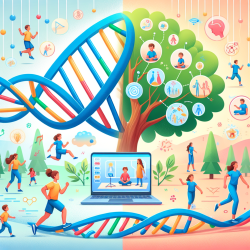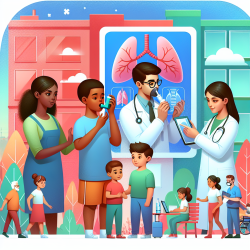Introduction: The Power of Genetic Insights
In the rapidly evolving field of speech-language pathology, integrating genetic research into practice can significantly enhance outcomes for children with neurodevelopmental disorders. The study titled "De Novo and Inherited Loss-of-Function Variants in TLK2: Clinical and Genotype-Phenotype Evaluation of a Distinct Neurodevelopmental Disorder" provides compelling insights into the genetic underpinnings of certain developmental challenges. By understanding these genetic factors, practitioners can tailor their therapeutic approaches to better meet the unique needs of each child.
Understanding TLK2 and Its Impact
The research highlights the role of TLK2 (Tousled-like kinase 2) mutations in neurodevelopmental disorders. These mutations, whether inherited or de novo, are linked to a range of symptoms including mild-borderline neurodevelopmental delay, behavioral disorders, and distinctive facial features. The study involved a comprehensive analysis of 40 individuals, providing a robust genotype-phenotype correlation.
For practitioners, this means that recognizing the signs of TLK2-related disorders can lead to earlier diagnosis and intervention. The consistent phenotype associated with TLK2 mutations underscores the importance of genetic testing in children presenting with developmental delays and behavioral issues.
Implementing Research Outcomes in Practice
Integrating genetic insights into therapeutic practice involves several key steps:
- Early Identification: Use genetic testing to identify children with TLK2 mutations early in their development. This allows for timely interventions that can mitigate the impact of developmental delays.
- Customized Therapy Plans: Develop individualized therapy plans that address the specific needs associated with TLK2-related disorders. This might include targeted speech therapy to address language delays or behavioral interventions to manage social-emotional challenges.
- Collaborative Approach: Work closely with geneticists and other healthcare professionals to create a comprehensive care plan. This multidisciplinary approach ensures that all aspects of the child's development are supported.
- Ongoing Research and Education: Stay informed about the latest research developments in genetic contributions to neurodevelopmental disorders. Continuous learning will enhance your ability to provide cutting-edge care.
Encouraging Further Research
While the study provides significant insights, it also highlights the need for ongoing research. Understanding the full spectrum of TLK2-related disorders requires further exploration of genetic variants and their phenotypic expressions. Practitioners are encouraged to contribute to research efforts by sharing clinical observations and participating in collaborative studies.
Conclusion: A Call to Action
By integrating genetic research into clinical practice, speech-language pathologists can significantly improve outcomes for children with neurodevelopmental disorders. The insights gained from studies like the one on TLK2 are invaluable in shaping effective, personalized therapy plans. As practitioners, embracing these advances not only enhances our professional capabilities but also transforms the lives of the children we serve.
To read the original research paper, please follow this link: De Novo and Inherited Loss-of-Function Variants in TLK2: Clinical and Genotype-Phenotype Evaluation of a Distinct Neurodevelopmental Disorder.










